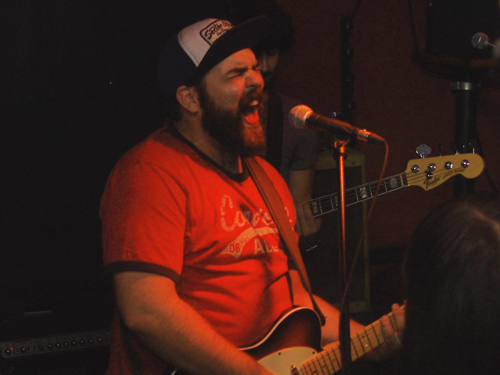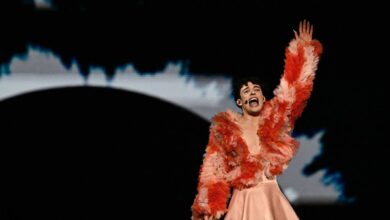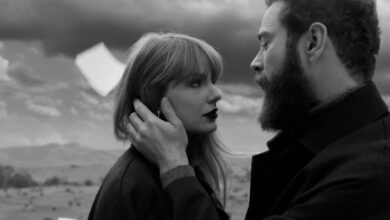
It doesn’t really matter what type of music Lazzy Lung performs. After watching the band open for the Black Lips at the Cairo Jazz Club last week, it’s hard to imagine the Beirut-based foursome disappointing a crowd, which can seem as excited about the music as about the banter expected in between. And, in both cases, the band delivers.
Lazzy Lung is very good at the type of music the band performs — a nostalgic, guitar-driven sound somewhere between Bloc Party and Funeral Party, with a hint of Les Savy Fav-style playfulness — and, after building a solid reputation back home that saw them conquering Rolling Stones’ first Battle of the Bands in the Middle East, they’re here, as frontman Allan Chaaraoui accurately predicted, to show everyone “what the fuss is all about.”
Egypt Independent met with the band members to talk about their breakout tour, building bridges, and worrisome moles.
Egypt Independent: So, the tour is also being filmed, and there’ll be a documentary. What can you tell us about it?
Anthony Sahyoun: The purpose of the documentary is … [Turns to Imad Jawad] what was it?
Imad Jawad: Bridging cultures.
Sahyoun: Yes. Bridging cultures. I hate that term.
Jawad: It’s an inaccurate term, because it indicates a process that goes two ways when it’s not. We Arabs already know what the West has to offer; they're not the ones lacking exposure. Which makes what we’re doing not so much “bridging cultures” as much as it is informing an ill-informed crowd.
We asked the same question, too — “why a documentary?” — when the director proposed the idea to us. We weren’t sure what he had in mind. He wants to show the world how awesome we are — not us, the band, but this region, this part of the world. He wants to show more than what the rest of the world sees on TV; that people here listen to different types of music, that they go out and party, and enjoy life.
Sahyoun: That’s a solid answer.
Jawad: It was a good question. We were asked a lot of retarded questions in our last interview, like “who are your main influences” and stuff.
EI: That was my next question.
Jawad: Really?
Sahyoun: Look, we listen to a lot of music. It’d be hard to mention all our influences, and unfair to name just one or two bands.
Jawad: We’re very passionate about music; we’ll listen to as many kinds as we can, and obsessively. But we won’t ever hear something we like, and try to recreate it. We also all have different tastes and that comes out in the music — one us of might add his own style to a song to make it more dance-y, while someone else might be more aggressive, or ‘rock’-sounding. Each person ends up bringing something different to the table.
EI: Rock tours aren’t that common in this region; yet you’re a Lebanese band, touring with an American one in a time when things are generally more unstable than usual. What has that experience been like?
Allan Chaaraoui: I’ve been to Egypt before. I did the whole touristy thing with the family back in 1996. Cairo’s always been a busy, boisterous city. Huge. [This time] I went down to Tahrir and noticed some of the damage to the area. But what I really want to know is, are people happier now, with these changes? Because it seems like there’s still a lot of unfinished business that needs to be dealt with.
Sahyoun: It’s all new. Even here, for me. I’ve never been to Egypt.
Jawad: People are different all over, from country to country, and a lot of times these differences can make them incompatible, maybe. But music is for everyone. Regardless of what differences might separate people, they can still enjoy the same type of music; it unites people. Even in regions like ours, where there’s so much shit separating people.
Where so many lines have been drawn by things like religion, and religious “differences.” Religion is like a mole — if you have one, you can either obsess over how beautiful it is, or you can be ashamed and self-conscious of it, or you can realize it for what it is: a fucking mole, and not worth making a big deal out of.
Sahyoun: I think that might be kind of offensive — comparing religion to a mole.
Jawad: Is it?
Sahyoun: I don’t know. Some people might get upset.
Jawad: I’m not trying to offend anyone.
EI: Traveling around the region, being exposed to different styles of music, even differences within the same style of music, do you feel any of it will influence your next album?
Sahyoun: It’s a little subtler than that.
Jawad: When any one of us grabs their instrument, the first thing you have to deal with, the first thing that goes through your head, is always whatever it is you personally might be going through at the moment. Just like any changes in my life might affect me, they’ll affect my music as well. So, it’ll be influenced in that way, more or less.
EI: There’s been a lot of buzz about you; you’ve released one album, and there’s another one in the works. Do you consider this tour, with the Black Lips, and the documentary element, to be your big break?
Chaaraoui: Definitely. This tour lead us here, to these performances, to this conversation. It’s getting our name out there, on flyers, in different cities, on multiple websites. And that’s what we want, so that people will be able to come down and see for themselves what all the fuss is about.
EI: What is all the fuss about?
Chaaraoui: We pride ourselves on being one of the tightest rock bands in the Middle East, aggressive, yet sentimental, and with incredibly awesome live performances. We take our performances very seriously. We try to get the audience to participate, try to get them to join in.
Marc Bassily: And so far the response has been great. I’ve been amazed at how much people have gotten into some of the shows. We’ve sold a lot of CDs, we’ve had people asking for our contacts …
Chaaraoui: Yeah, people are definitely trying to sleep with us.
EI: So far, most regional rock bands have had somewhat limited success.
Chaaraoui: There are a lot of [bands] out there, but not many of them make you want to give a shit. That’s where we try to be different, by hosting an event with added value. In the end, most people are there because they want to party, not just listen to music, and you have to [respond to] that.
Bassily: Yeah. It’s also important to plan those events at the beginning of the month, because by the end, everyone’s broke.




